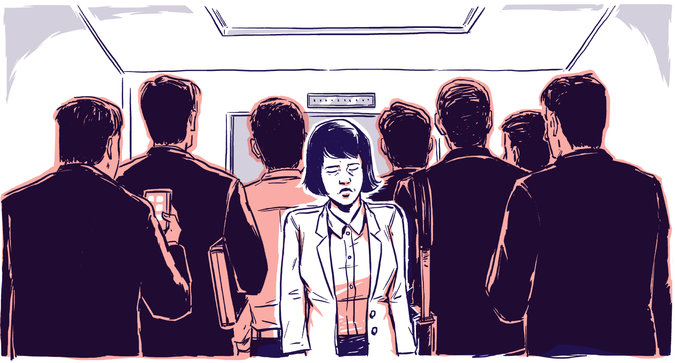Let’s start with two hypothetical situations. Zoe is an analyst and is looking for a job in a consultancy company. She knows that the bar to get hired will be higher for her than for the male applying to the same job with similar skills and qualifications. She is also aware that she may be paid less and may encounter more difficulties to obtain promotions than her male counterpart. Audrey works at a switchboard to assist clients with their orders. She knows that to get the same amount of work done she has to be faster and more professional than her male colleagues because customers may not take her as seriously.
In the first situation Zoe faces what is known as employer-based gender discrimination, whereas Audrey deals with a customer-based gender discrimination. While both these forms of unfair behaviour happen quite frequently, the latter has attracted the attention of research, politics and the general public just recently. This because consumer-based discrimination can look a lot like employer-based discrimination and it is more subtle to detect: Audrey may be so used to it that she may think her male colleagues face the same challenges too; similarly, her colleagues may think that Audrey is underperforming because she is less good at her job than them. This vicious circle of prejudices and interpretations ad hoc keep making Audrey doubt of herself, and her colleagues and managers doubt of her capabilities.
Local facts, universal repercussions
Now, let’s bring up some very recent facts. Martin R. Schneider had one of his worst days at work because clients were suddenly turning rude to him, without any plausible explanation. After noticing that his emails were unexpectedly signed as “Nicole” instead of Martin, he decided to start an experiment. He switched his emails signatures for a week with his then-colleague Nicole Hallberg. The result was shocking for him. “I was in hell,” Martin wrote on Twitter. “Everything I asked or suggested was questioned. Clients I could do in my sleep were condescending. One asked if I was single.” Conversely, Nicole, disguised as Martin, was having “one of the easiest weeks of her professional life”. By the end of the week Martin learnt many more difficulties Nicole had to go through in her daily activities and, most importantly, understood why it took her longer to get her work done (the full story can be found here).
A sector in which being a woman can be particularly troublesome is the tech industry. The Wall Street Journal reports that codes written by female engineers at Facebook Inc. undergo tougher scrutiny and, as a result, receive 35% more rejections than men’s codes (Seetharaman, 2017). Still the same journal suggests, in a previous article, that women in the tech industry should consider masking their gender to get further professionally (Greathouse, 2016).
Penelope Gazin and Kate Dwyer are a duo of entrepreneurs based in Los Angeles. They had the innovative idea of starting their own marketplace for weird art. After one year from its creation, Witchsy (the online platform) is rather successful with $200,000 worth of art works sold. However, Penelope and Kate explain that they had to come up with unusual ways of doing business to face some of the more unexpected obstacles. How do you turn external male collaborators that are slow to respond and disrespectful in correspondence into fair co-workers? They decided to introduce a third co-founder: Mr Keith Mann, who was entirely fictional and whose role was to communicate with outsiders over email. The change observed was significant, “It was like night and day,” says Kate. “It would take me days to get a response, but Keith could not only get a response and a status update, but also be asked if he wanted anything else or if there was anything else that Keith needed help with.” (the full story can be found here).
The stories and facts reported above do not only have the role of creating awareness towards the existence of various forms of discriminatory behaviour. Any form of discrimination is objectively bad, but which are the economic damages that the behaviour from the above examples generate? Nicole’s experience shows that she is prevented from doing the best job she could. In this way her productivity is lowered and, consequently, her firm’s total productivity too. The articles on the tech industry highlight how good codes may be rejected and deserved promotions turned down if your gender is female. This generates a lack of efficiency in the industry: more time will be used to write a new code and people that may be less deserving will obtain a promotion based on their gender. Penelope and Kate’s story suggests us that, if they did not have the unorthodox idea of generating a male alias, their venture may have not been successful. Their failure would translate into economic costs related to the (monetary) gain made by the artists and the pleasure (utility gain) that the arts sold gave to the buyers.
Ultimately, who would suffer the most are the very clients that trigger this consumer-based discrimination. Lower productivity, inefficient sectors and lack of innovative start-ups means that products and services will take longer to be delivered/produced and will come at a higher cost. Competition alone can work as a deterrent from employer-based discrimination, because firms that discriminate over characteristics that have nothing to do with skills and qualifications will be less productive and will be pushed out of the market. However, consumer-based discrimination will not be competed away. Governments need to take a central role in the design and implementation of educational, social and economic policies to tackle customer-based gender (and ethnic) discrimination.








